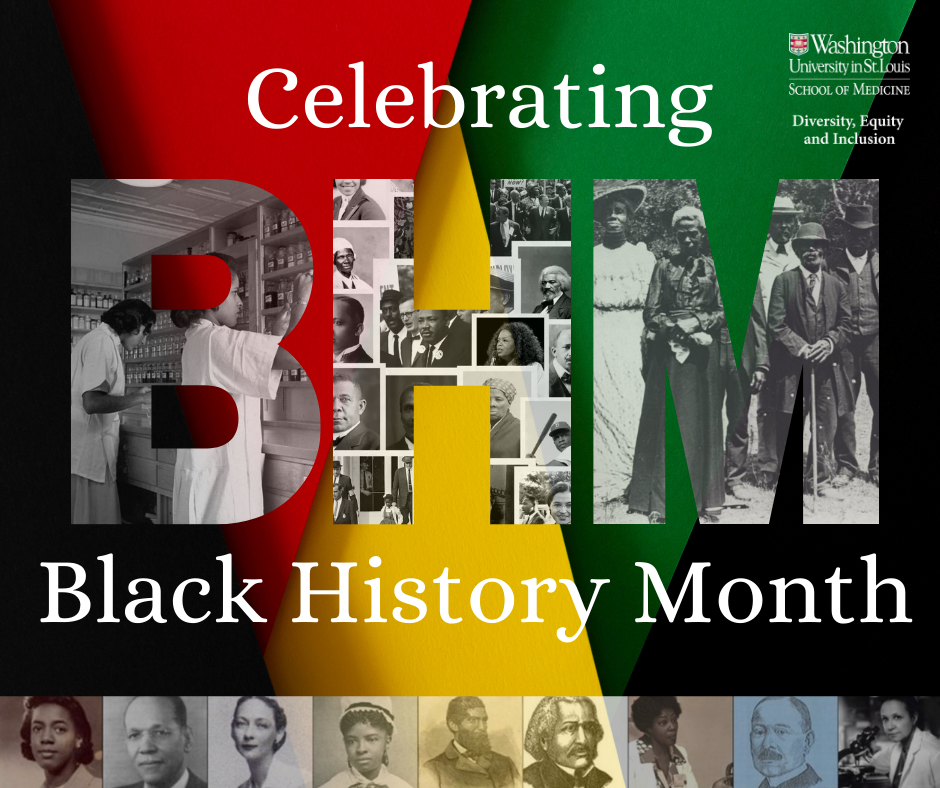This month, WashUMedODEI celebrates Black History Month. Black History Month is significant in the context of medical education as it helps to highlight the contributions and experiences of Black individuals and communities in healthcare. By acknowledging and celebrating Black history, medical institutions can work towards creating a more inclusive and diverse learning environment, where all students feel represented and valued. This ultimately leads to better healthcare outcomes for all patients, as medical professionals are educated about the unique challenges and barriers faced by Black communities.
Some examples of specific contributions made by Black individuals in healthcare include, Rebecca Lee Crumpler, who was the first Black woman to earn a medical degree in the United States. In addition, Charles R. Drew, who developed techniques for processing and preserving blood plasma and Vivien Thomas, a Black surgical technician, played a crucial role in developing the surgical technique for blue baby syndrome.
Origins of Black History Month:
The story of Black History Month begins in 1915, half a century after the Thirteenth Amendment abolished slavery in the United States.
That September, the Harvard-trained historian Carter G. Woodson and the prominent minister Jesse E. Moorland founded the Association for the Study of Negro Life and History (ASNLH), an organization dedicated to researching and promoting achievements by Black Americans and other peoples of African descent.
Known today as the Association for the Study of African American Life and History (ASALH), the group sponsored a national Negro History week in 1926, choosing the second week of February to coincide with the birthdays of Abraham Lincoln and Frederick Douglass. The event inspired schools and communities nationwide to organize local celebrations, establish history clubs and host performances and lectures.
The Black History Month 2024 theme, “African Americans and the Arts,” explores the key influence African Americans have had in the fields of “visual and performing arts, literature, fashion, folklore, language, film, music, architecture, culinary and other forms of cultural expression.”
Check out the following events and activities taking place at Washington University and throughout the St. Louis area during Black History Month. You will also find links to readings and videos to guide your reflections beyond Black History Month.
School of Medicine Campus:
- Tuesday, February 6th from 2:00-3:00pm on Zoom – Black in Academia – Postdoctoral Series, hear from esteemed Black postdoctoral scientists as they talk about their unique experiences navigating academia.
Danforth Campus-Equity, Diversity & Inclusion Events:
- Friday, February 2nd at 7:00pm-Black Anthology: ‘Pressed’
- Thursday, February 8th at 7:00pm in Graham Chapel – Isserman Lecture featuring Rev. Otis Moss III, Religious, Spiritual & Ethical Life at WashU invites you to join us as we welcome The Rev. Otis Moss III, Senior Pastor of Trinity United Church of Christ.
- Wednesday, February 21 from 12:00-6:00pm in Holmes Lounge – Black History Month: Artifact Exhibit, Join us on a remarkable journey through Black history and culture with the Homage Exhibit.
- Friday, February 23 from 12:00-6:00pm in Umrath Lounge – Black History Month: The Influence of the ‘Divine 9’, This exhibit focuses on members of the “Divine 9” who helped create a culture of change and resistance that impacted the Civil Rights Movement in America.
St. Louis Community Events:
- February 23, 2024 at 7:30pm – Black History Month Concert “Life Every Voice” presented by the St. Louis Symphony Orchestra at the Stifel Theatre.
- Missouri History Museum Black History Month Celebration
- St. Louis County Library Black History Month
- BELLEFONTAINE CEMETERY Black History Month Events
- St. Louis Public Library Black History Month Events
- The Griot Museum of Black History in St. Louis
- George B. Vashon Museum of African American History
Reading and Viewing:
- Read this article about Dr. Will Ross who was named the St. Louis American’s 2022 Person of the Year
- Learn more about African American history across the City of St. Louis
- Listen and watch One Mic: Black History
- Listen to the NPR program Code Switch
- Watch this short YouTube Video by our medical education and medical student team – The Divide: Confronting Racism in American Health Care
- Missouri History Museum BLACK HISTORY HIGHLIGHTS
- Jeannette Cooperman
The Story of Segregation in St. Louis
St. Louis Magazine, October 17, 2014 - ‘To Serve the Community Best’: Reconsidering Black Politics in the Struggle to Save Homer G. Phillips Hospital in St. Louis, 1976-1984
- Beyond “In Their Own Words”: Stories of Black Excellence and Resources on the Intersection of Race and Medicine
- History: Black History
- The Association for the Study of African American Life and History
- Explore St. Louis Black Culture
- Black in St. Louis
- St. Louis American Celebrating Black History
- What you need to know about the origins of Black History Month
- A digital map shows unknown towns in the St. Louis region that Black people settled
